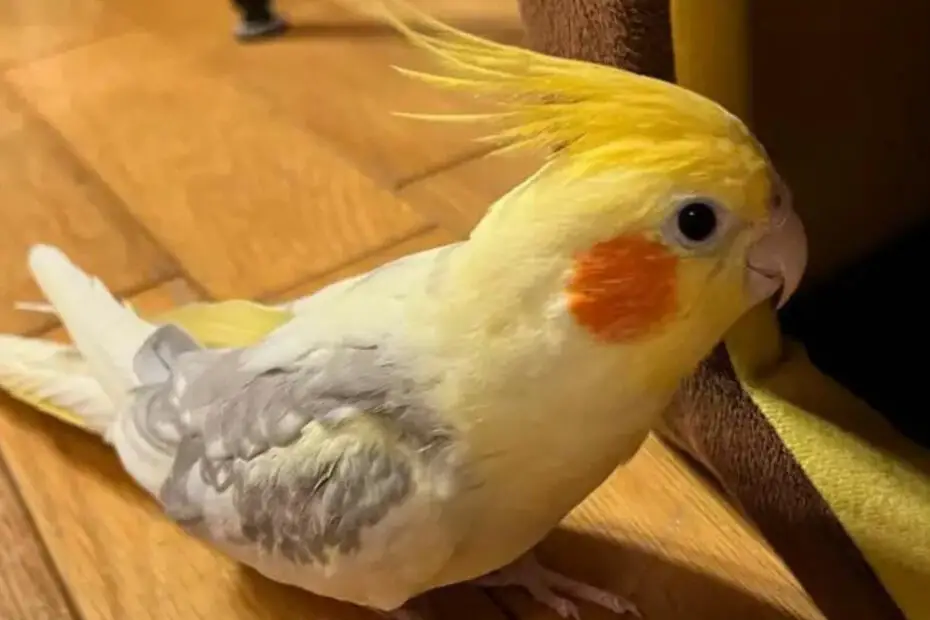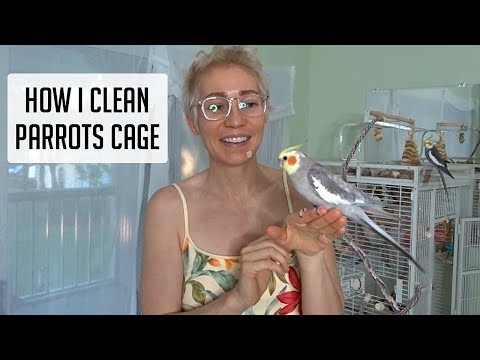According to a study on viral diseases of companion birds, psittacine birds, including cockatiels, are more resistant to the highly contagious Exotic Newcastle disease virus. But that doesn’t make Cockatiels immune. They are still susceptible to other common illnesses, including respiratory, parasitic, bacterial, and other viral diseases.
Changes in behavior and appearance may often help monitor bird health. Nevertheless, Dr. Marty Becker points out that birds that are ill, including cockatiels, have a tendency to conceal the outward indications of sickness.
Therefore, you should have a broad understanding of potential cockatiel health issues that may arise. It will enable you to take appropriate steps before the diseases become too severe.
This guide on cockatiel health for beginners provides a comprehensive overview of common health issues affecting cockatiels. We’ll discuss the signs of cockatiel illness and how to prevent these conditions. Also, we’ll show you how to care for your sick cockatiel and the importance of seeking veterinary care.
Common Cockatiel Health Concerns
Let’s unravel the common health issues cockatiels may experience, including the risk factors. Note that these are conditions affecting all cockatiel species and breeds. Some conditions, such as lutino cockatiel syndrome, are a genetic mutation and shouldn’t be confused with a medical issue.
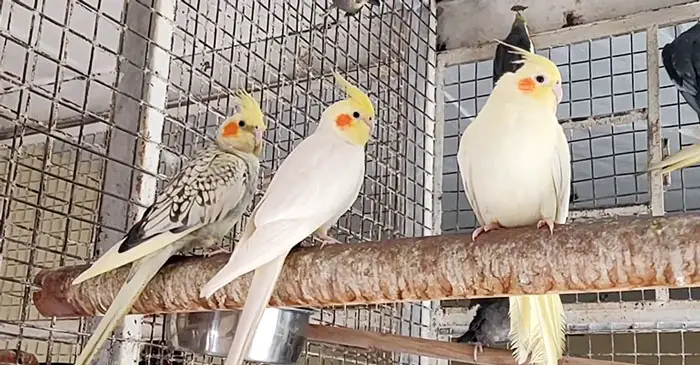
Respiratory Infections
According to a study on psittacine birds, respiratory diseases are the most common clinical conditions in parrots, including cockatiels. The unique bird anatomy allows them to breathe air in only one direction, making them more susceptible to respiratory diseases.
- Avian chlamydiosis: Avian chlamydiosis or Chlamydophila psittaci, is the most common respiratory illness in cockatiels. It’s a good example of cockatiel diseases transmitted to humans, causing Psittacosis or Parrot Fever. Observable signs in cockatiels include swollen eyes, nasal discharge, ruffled feathers, yellow-green droppings, and weight loss.
- Aspergillosis: Aspergillosis is another ailment. However, it’s less frequent in cockatiels, often affecting poultry. Signs of aspergillosis include shortness of breath, drowsiness, and weight loss.
Parasitic Infections
Mites are the most common form of parasitic infection in cockatiels. There are three types of mites according to the affected areas. Your bird can have feather mites, air sac mites, or scaly face/leg mites.
- Feather, and air sac mites: Feather mites burrow into your bird’s feathers. These small mites cause irritation, leading to excessive grooming and restlessness. Also, your bird will start plucking at the itchy feathers. Air sac mites burrow into the respiratory tract, causing repeated coughing and voice change in severe cases.
- Scaly mites: Scaly mites infest the unfeathered parts, including the legs and beak. They burrow into the beak and legs, causing crustiness. Beak problems like amputation and deformities may occur in severe cases.
- Coccidiosis: Avian coccidiosis is another parasitic disease that affects most parts of the intestine. Your bird will often experience diarrhea and dehydration, resulting in weight loss.
Bacterial Infections
These infections lead to gastrointestinal and respiratory diseases. Common bacteria infections include chlamydiosis, also a respiratory disease discussed earlier. In addition, there’s avian mycobacteriosis, which often affects older birds. Signs appear internally, including lesions in the liver and intestinal tract.
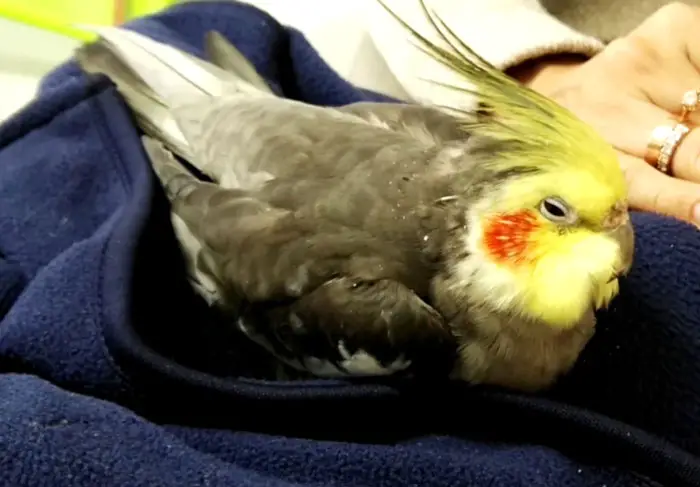
Viral Infections
Viral diseases primarily affect young cockatiels. Psittacine Beak and Feather Disease (PBFD) is a good example of viral avian diseases affecting cockatiels. This disease lowers the immune system, making the bird vulnerable to other ailments.
Apparent signs include abnormal feather growth and beak problems like lesions. There’s no treatment for this fatal disease, only supportive care.
Avian Polyomavirus (APV) is another viral disease that affects young cockatiels less than 6 to 7 weeks old. The infection is often fatal to bird health and might lead to death 24-48 hours after the onset of clinical signs. Symptoms include abnormal feather growth, acute lethargy, and intestinal obstruction.
Most Common Symptoms of Cockatiel Illness
We’ve looked at common cockatiel medical issues. Nevertheless, there are apparent signs that indicate general illness. They may be physical or behavioral: as follows.
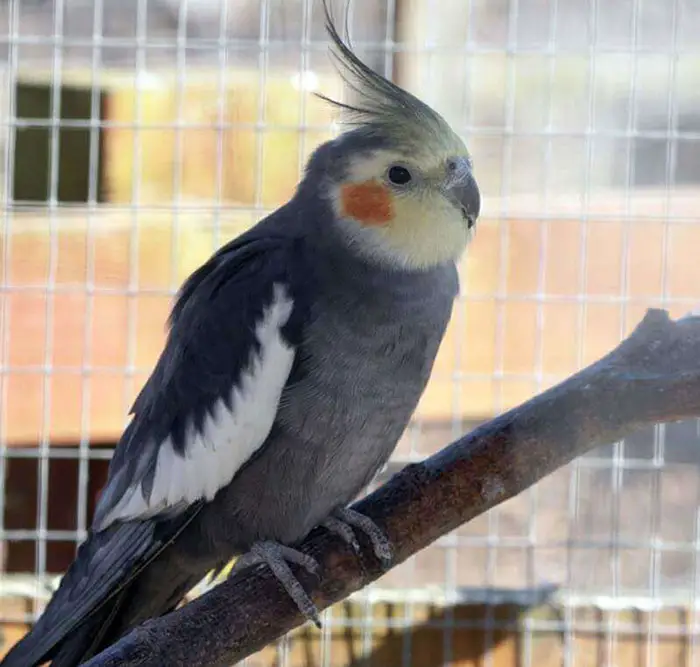
- Respiratory symptoms: Wheezing, coughing, sneezing, and breathing difficulty are the primary signs of respiratory illnesses. It may indicate chlamydiosis or aspergillosis in cockatiels.
- Lethargy: Your bird will be less active than usual. It may appear weak and slow to respond to stimuli. Oftentimes, a lethargic bird will have drooped wings or ruffled feathers. This symptom often indicates a more serious condition.
- Loss of appetite: If the bird doesn’t touch the food you offer for 24 hours, there’s a high likelihood of underlying sickness.
- Changes in droppings: Healthy cockatiels have firm brown or green droppings with small amounts of white urates. Any changes in color, consistency, and frequency may be a sign of illness.
- Discharge: Any discharge from the eyes, nostrils, beak, or vent may be a sign of illness.
Apart from standard signs of sickness, it’s beneficial to be familiar with the indicators that require urgent medical care. In the case of your feathered friend, take your bird to the emergency room immediately if it has difficulties in breathing, has a water belly, or bleeds. Also, dying symptoms like collapsing and sudden violent movements need urgent medical care.
How To Monitor Your Cockatiel’s Health?
Watching over your Cockatiel’s health will help you uncover any ailment early on. So, how can you keep an eye on bird health? Do these as follows.

- Monitor bird’s behavior: You can observe changes in bird behavior. See if your bird responds to stimuli, has unusual changes in vocalization, or shows inactivity. Also, note any change in drinking and eating behavior.
- Keep an eye on its weight: Another sure way is to monitor your bird’s weight. Adult cockatiels will often weigh around 70-120g. Any sudden loss in weight could be a sign of illness.
- Check the feathers: Also, check your bird’s feathers. A healthy bird should have well-groomed feathers. Any ruffled or dull feathers is a sign of sickness or injury. Moreover, examine the bird’s droppings after every 2-3 days to catch any changes in color and consistency early on.
- Check the breathing: In addition, you can watch your bird for any signs of breathing difficulties. Labored breathing accompanied by wheezing and coughing could signify respiratory infection.
- Schedule regular vet checkups: While you do these routine monitoring, schedule regular vet checkups. The vet will uncover and treat any underlying sickness before it becomes a problem.
The Importance of Seeking Veterinary Care
Now that you know the signs of a sick cockatiel, why not just treat the bird yourself instead of taking it to the vet? Well, there are several reasons you shouldn’t treat the bird yourself.
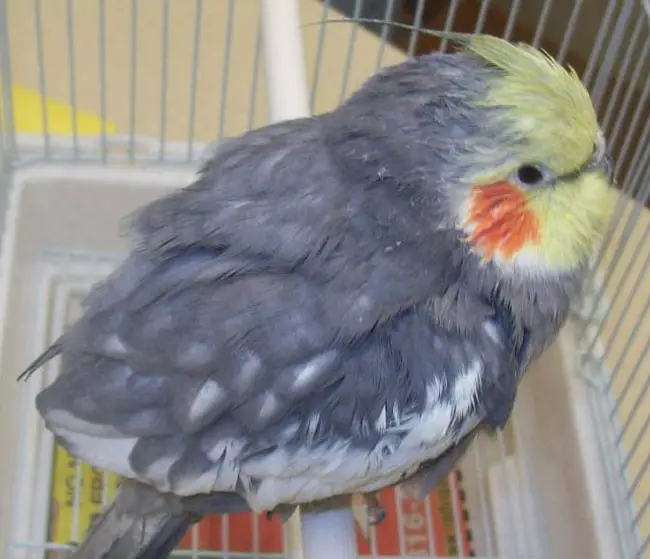
The Complexity of the Illness
First, administering bird medication can be challenging. As we discussed earlier, birds tend to hide illness. Hence, your bird may only exhibit subtle symptoms. This makes it challenging to identify the exact cause of your bird’s illness.
And without proper diagnosis, you may administer incorrect treatment that may worsen your bird’s condition. Also, any apparent signs of illness usually mean the disease has become quite advanced.
Obligations of Acquiring Health Certificates
Some countries require animals, including pet birds, to have health certification. And you can only get it from a veterinarian. For this reason, it’s important to seek veterinary care for pet birds.
Your vet will do a proper diagnosis and provide a specific medication that’s safe and effective for your pet. Besides treatment, your vet will advise you on proper nutrition, hygiene, and other aspects of bird care. This will help prevent health issues from arising.
Preventive Measures for Cockatiel Health Issues
Preventing diseases before they happen will lower healthcare costs and increase the longevity and quality of life of your bird. Most often, preventive care starts with providing bird healthcare equipment for their health and well-being.
Such equipment includes a bird cage, feeders, bird bath, and bird first aid kit. Other four preventive care for cockatiels include:
- Proper care and hygiene: Maintaining a hygienic environment is vital for your cockatiel’s health. Ensure the cage and accessories are kept clean and in good condition. Research how to properly clean a cockatiel’s cage and give your pet regular baths for optimal feather health. In addition, a regular bird grooming routine is a great way to protect against potential parasitic infection.
- Comfortable and stimulating environment: Cockatiels are social and intelligent birds. This means they require physical and mental stimulation. So, provide new toys and enough space to play in their cage. Also, give them about one hour of attention daily, and occasionally let them out of their cage to play outside.
- Proper bird nutrition and supplements: Cockatiels need a balanced diet comprising bird pellets, fresh vegetables, and low-sugar fruits to stay fit and healthy. Also, don’t forget to provide a small amount of seed mix. Too much seed mix or nuts may cause obesity and fatty liver disease.
Experts typically recommend 70-80% pellets, 10-30% fresh fruits and vegetables, and 5% treats for a healthy cockatiel diet. It’s also a good idea to incorporate mineral and vitamin supplements into your bird’s diet.
- Quarantine and disinfection measures: When bringing a new bird home, quarantine it to prevent the spread of common illnesses. Also, use disinfectant to clean the cage and bird accessories to prevent the spread of bacteria or other pathogens.
Caring for Sick Cockatiels
Is your cockatiel sick or recovering from illness? Here are pet care tips to ensure a fast recovery.
Keep Your Bird Warm and Comfortable
Cockatiels are sensitive to quick bursts of cold air. That’s why you’ll often see them fluffed to retain heat. Such bursts of cold air stress their immune system, making them more vulnerable to diseases. So, ensure your bird is warm by placing a heat lamp near the cage.
The ideal temperature for cockatiels is 65 to 85 degrees Fahrenheit. So, try to maintain this temperature for fast recovery. Also, you can place heavy curtains on doors and windows to keep outbursts of cold air.
Administer Medication and Monitor Progress
Administer bird medication by following the vet’s instructions. It may be oral pills and drops, or injections. Whatever the case, ensure to give your cockatiel the correct dosage at the correct intervals. While at it, restrain your bird gently, and reward them with some treats after each medication.
Look for any signs of improvement in your cockatiel’s behavior to know if the bird is responding well to treatment. If you find that your cockatiel is becoming more active with time, it means the treatment is working and you should proceed.
However, if the condition of your bird worsens, notify your vet to adjust medication or provide additional treatment.
Manage Nutrition and Hydration
Your bird may need a special diet to aid recovery. Therefore, stick to the diet that the vet recommends for your sick bird. In addition, ensure access to fresh drinking water.
You might also consider an electrolyte solution instead of pure water to keep your bird hydrated. To prepare the solution, mix one tablespoon of salt and honey in 4 cups of warm water. Honey’s antibacterial properties can help fight infection, while the water will help keep your bird hydrated.
FAQs
Here are some frequently asked questions that people want to know about cockatiel health.
Cockatiels generally don’t contract human diseases. However, they can get respiratory diseases like flu and psittacosis through human contact.
Stress lines, aggression, fear, and loss of appetite are common signs of a stressed bird. Other indicators include feather plucking and destructive behavior. Preventive measures for stress include providing a quiet and comfortable environment, a healthy diet, and toys to prevent boredom.
There are ways how to treat your sick cockatiel at home. However, it only works for mild health issues so it shouldn’t be a substitute for veterinary pet care. Your bird may hide some symptoms making it difficult to determine the underlying cause of the illness without veterinary help.
Provide your bird with toys, a healthy varied diet, and regular outings. Also, try to interact with your pet bird daily to reduce loneliness.
Cockatiels love company and get along with most small birds. Some of the best companions for cockatiels include budgies, lorikeets, Bourke parakeets, and turquoise parrots.
Conclusion
To wrap it up, your cockatiel may suffer common illnesses, ranging from bacterial, respiratory, viral, and parasitic diseases. However, proper pet bird care practices and routine vet checkups may prevent such diseases from happening in the first place.
We always insist on preventative care since some cockatiel diseases don’t have a cure. In addition, it’s advisable to seek veterinary care to better understand the underlying cause and offer appropriate treatment.
Remember that these measures are for your well-being and that of your bird since some of your pet bird’s diseases can be transmitted to humans. So, we recommend doing further research on reputable websites, such as the Association of Avian Veterinarians. This will help you learn more about cockatiel health care, including their nutrition, behavior, and common health issues.
